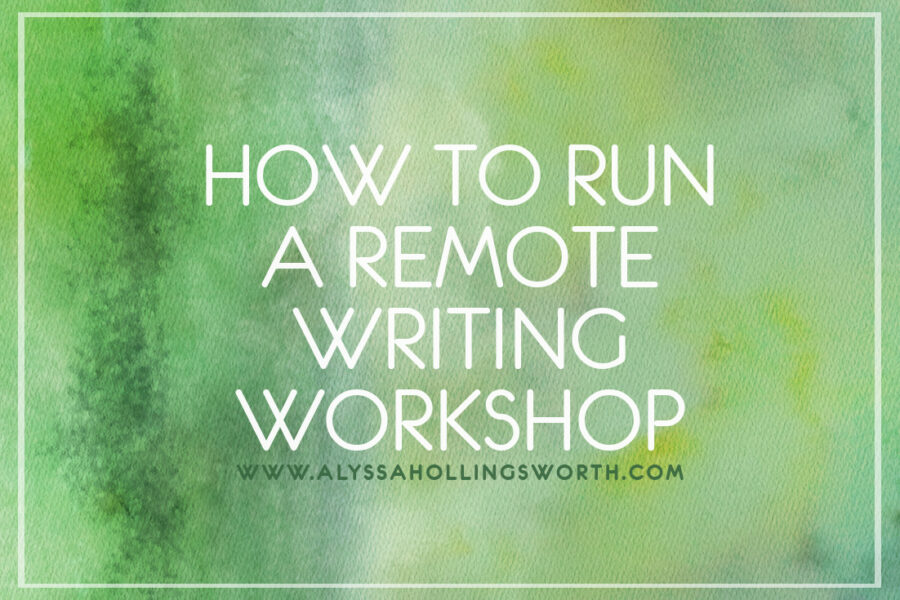Back in 2014, I finished my MA in Writing for Young People. Workshops were a vital part of the coursework, my love for them grew exponentially. We officially stopped workshopping for class in May of that year.
But unofficially? We never actually stopped.
Sure, people pop in and out of the group as schedules change, and we’ve added another writer in the meantime. But a year and a half after our workshops “ended,” most of us meet every other week to critique each other’s pieces, even though we’re now split across three different time zones.
How do we do it? Here are some of my tips.
1. Be Organized
When you’re initially setting up the group, talk honestly with your mates about what will work for them. If the schedule is too strict, people won’t be able to keep up and they’ll fall out. If it’s too loose, people will lose interest or simply forget.
Here’s the way we structured ours:
- Split the group into smaller chunks. Normally it gets hard to workshop more than three people, maximum, because of the time required for the reading and the meeting itself. So your groups might look like: Group A (2 people), Group B (2 people), and Group C (3 people).
- Assign a word count range. Depending on the size of your groups (and the time they have to read), this could go between 1500-2500 words.
- Make a schedule. Again, this will depend on how busy your team is. We give ourselves a week for reading, which spaces out the commitment (and ensures we get every other weekend free). Check out the table below to see what I mean:
| Group A | Submits on the 1st Workshops on the 8th |
| Group B | Submits on the 15th Workshops on the 22nd |
| Group C | Submits on the 29th Workshops on the 5th |
- Set a day and time. As I mentioned before, my workshop team is split over three time zones (GMT, EST, and PST). The time that works best for us tends to be 10 AM EST on a Saturday. If someone wants to come but can’t make that day/time, we might move it forward or back an hour, or switch it to a Sunday. Every week before workshop, I post on our Facebook group to confirm the day/time with everyone and see who’s expecting to make it.
Which leads rather nicely into the next step…
2. Utilize Technology
Specifically: Skype/Google Hangouts and Facebook.
Facebook groups are great. They can be private and small, and they’re not as overwhelming (or hard to keep track of) as email chains or group messages.
You can go as custom as you want with the page. My writing group gave ourselves a nerdy name (“The Offenders”), so I made us a parody-Avengers logo for our header. Be sure you make a pinned post to the top of the page with the group break-down and word count range. That way, anyone can figure out when they need to submit at a glance.
Skype and/or Google Hangouts work great for the workshop itself. We tend to prefer Skype because it’s more user-friendly (and most of us use it somewhat regularly anyway). Normally I set up a group chat a few minutes before we’re meant to start, so people can get ready (there’s often a bustle of last minute tea preparation). Then it’s easy to turn it into a group call and get going.
Google Hangouts works, too, so it’s really just a matter of which one your group prefers. Sometimes we switch to Google if Skype is acting up, or vice versa.
3. Find a Mom
Due to the aforementioned organizing/communicating, it helps if your group has some sort of “leader.” Leader is a tricky word, though, because if you’re not actually in a class then you’re all equals. It becomes awkward when one of your writing peers starts acting like the expert.
So instead, I’m going to call this person the group’s mom.
I’m the self-appointed mom of my group. When it’s time to make plans, I’ll post on our Facebook page and chase up people in messenger. When it’s time for the call, I’ll put everyone in one place. During the call, I’ll often help gently steer conversation to make sure we stay on track. (At least, if I’m not derailing everything to talk about Star Wars or travel plans.)
Moms are great because they make sure the wheels keep rolling, but not at the expense of leaving people neglected. They’re also nice because if they can’t fulfill an obligation (for instance, they miss a workshop), someone else can step in easily and take their place. It’s a very chill sort of leadership.
In most groups, a natural mom will emerge. But it helps to take a look around and see if a mom’s coming out. If not, you might want to appoint someone. Not that I’m biased or anything, but Hufflepuffs make great group moms.
(By the by, I showed this to my group for approval, and they heartily agree with all of this.)
4. Be Accountable, but Flexible
It can be a delicate balance to land between a dictatorship of rules and a wishy-washy non-start. Both have the capability to make a group fall apart. But when you find the right rhythm, your group will really come together.
Check when you haven’t heard from someone. If someone’s workshop is coming up and they have not submitted their piece by the Thursday or Friday before our meeting, I like to shoot them a little message asking if they plan to send anything in. Often they’ve just forgotten to do it. Sometimes they can’t, and that’s totally fine. Reaching out (not nagging) helps reinforce the community, and creates an atmosphere of accountability.
Workshop even if only a few people show up. Sometimes we only have three people of the seven able to join for a workshop. But we still meet. These smaller gatherings are often really nice–normally we can go deeper into critiques because we have more time. When only two people can meet, it might be time to postpone. But don’t stop meeting just because the group waxes and wanes.
Assess your group periodically, and be open to changes. At the start of the new year, I opened a thread on our page asking everyone to weigh in on how we were doing. Were the meetings too long? Too short? Were our groups working well, or did we need to mix and match people? Did we want to add anything extra to our workshops–like optional write-ins on our reading weekends or full manuscript beta exchanges? Some productive restructuring came out of our discussion, and I’m hopeful it will make the coming year even more effective.
5. Have Fun
If you only meet to critique each other, it becomes hard to actually care about the people in your group. I’ve had this happen in other workshops where we were all business. We didn’t know each other, we hardly knew our projects, and so we didn’t really care. Because we didn’t care, we fell apart.
In some ways, my current group is lucky because we got to know each other in person before we started running our own workshops. But you can form that sort of community even if you don’t have the chance to get coffee or ride the bus together.
We always keep about twenty or thirty minutes free in the beginning of our workshop to talk about our lives, our writing progress, and our publishing news. We also often interact outside of workshop individually, exchanging funny blog posts and helpful research and Sherlock fangirling.
As far as getting to know each other’s projects, I highly recommend using the first few workshops to exchange synopses (yes, you can (and should) write it before you finish the manuscript) and first chapters. We also have the occasional workshop to just talk plot. Everyone brings a problem in their manuscript to the table and we discuss how it could be fixed. This helps put your team on the same page (haaa) and makes it easier for people to invest in each other’s stories.
Writing workshops can be hard to pull together and challenging to maintain, but when your group clicks it is completely worth it. My manuscripts wouldn’t be the same without these beautiful turtledove goddesses – and neither would I!


















